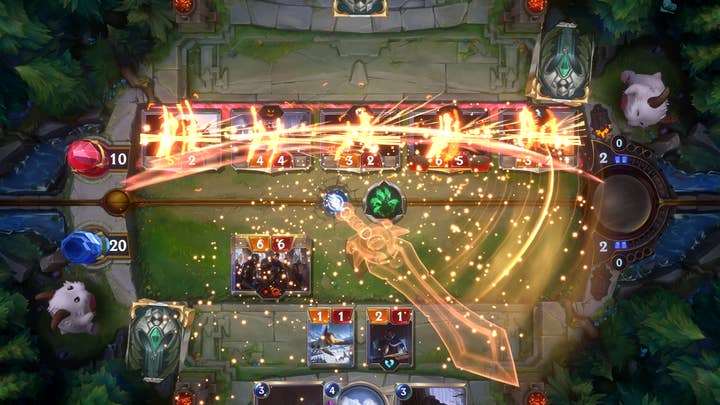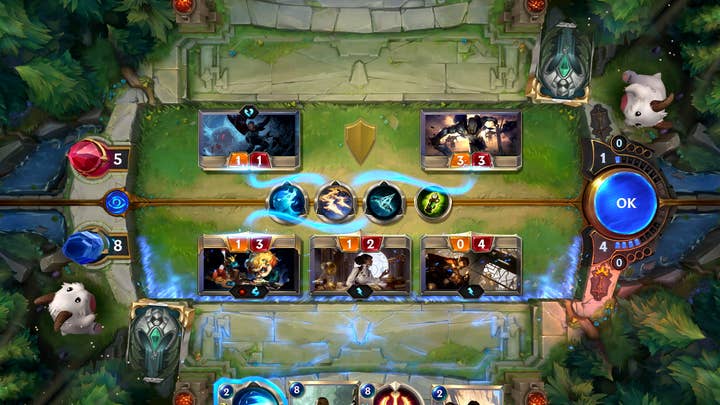How Riot Games' Legends of Runeterra will bring "true free-to-play" to the CCG space
League of Legends developer ditches random packs for rewards scaled to play time and wild cards that let you buy anything
Of the many projects Riot Games announced last week, Legends of Runeterra was perhaps the most predictable. In the wake of Blizzard's success with Hearthstone, many a fantasy gaming IP has been applied to the collectible card game model, including Elder Scrolls, The Witcher, and RuneScape.
It's no surprise then that a League of Legends CCG has actually been in the works for close to a decade, keeping a watchful eye on the rise and fall of rival card games in the hopes of bringing something new to the table.
"We've learned a lot of lessons from what other card games have done in the past, and felt that we could learn from that and make a new product that is exciting for players," game designer and live balance lead Steve Rubin tells GamesIndustry.biz.
"We're players who have played CCGs our entire lives and we've lived those lessons. We've gone to tournaments, we've played casually, and we really think that using something powerful that players love like the League IP, we've come up with something really great."

The biggest struggle other titles have faced lies in card accessibility, with players facing "a huge barrier to entry to play a card game."
"Not only do you have to learn how to play, but you also have to spend a ton of money on booster packs or buying the singles you want," says Rubin. "This stuff has really prevented players from being able to play, which really sucks.
"We're not trying to necessarily saturate the CCG market; we're actually trying to make a game that more players can fall in love with. We love [card] strategy games and we think more people will love them too if they're more accessible."
Rather than Hearthstone, perhaps the closest comparison for Legends of Runeterra is Valve's Artifact, which was based around rival MOBA Dota 2 (incidentally, a sequel to the original inspiration for League of Legends). The lineage is similar, yet Artifact's struggles have been well documented.
"We definitely learned some stuff from Artifact's launch," Rubin says. "We've seen their failures, and even some of the stuff they did well, honestly. We took that as an opportunity to really grow our game. We've learned from their mistakes."
Perhaps the biggest issue for Artifact was the business model: a $20 entry fee to a game that still had a marketplace for buying better cards. Rubin is confident that his game offers the opposite, proudly declaring it to be "true free-to-play."
"We're not trying to necessarily saturate the CCG market... We think more people will love them too if they're more accessible"
"If you want to play casually or competitively, in both those situations Legends of Runeterra will hopefully be easier than some of our competitors to get in there."
The increased scrutiny around the industry might have played a part in that "true free-to-play" ambition. Card packs, specifically those found in FIFA Ultimate Team, have been used as a prime example of the way loot boxes and monetisation mechanics around randomised content can cause financial harm to players, with calls to even regulate them as gambling.
Rubin believes booster packs are "not all negative" and stresses the reason Legends of Runeterra doesn't have them is "not because we think they're predatory -- we just think we can do something better for who our players are."
Riot Games faced a problem, however, in testing when players were confused as to how they would gain extra cards or what they might open to discover what content they have unlocked.
"That was an interesting challenge for us because we were like, 'Man, we're giving you everything, isn't that cool?' but players were like, 'No, we still want to open stuff and progress.' So about a year ago, we shifted models. People like opening booster packs, but we don't want people to have to pay for randomised content."
The team's solution is The Vault, which Rubin believes offers a mystery unlock "in a fairer way." This is a weekly content drop that gives players random items, but the quality of that content is based on how much XP they have gained or time they have put in over the course of the week.
Similarly, the Regional Wars feature means that players can select one of Runeterra's six regions from which they gain cards. These are still randomly selected but from a specific set, and players can change which region's cards they're unlocking at any point.
Of course, there will still be some monetisation, and Riot is confident it has come up with a fair system: Wild Cards. These can be redeemed for any card in the game, so if players don't want to grind for a specific item, they can just purchase a Wild Card and use that in exchange.

"We know that some players are going to want to buy stuff," Rubin explains. "At first, we had some systems where players couldn't really buy that much stuff. We really liked it that free-to-play players wanted a level playing field. People really don't like playing against 'wallet decks,' where they join a game for the first time and their opponent has a $150 deck they can't compete with. One of our goals is to serve free-to-play players and make it a fair playing field.
"We want to have games for everybody because we think the League of Legends IP is so strong"
He continues: "[With Wild Cards] We're essentially saying that every champion and their different rarities are all the same value. We have a situation where we want to make sure free-to-play players can experiment and not feel punished for not paying."
Riot Games has put a weekly limit on the number of Wild Cards players can buy, in an attempt to both preserve the balance of the game and avoid the criticism that comes from enabling players to spend hundreds of dollars on content with little to no barrier.
It's a model that was divisive among influencers during testing -- pack-opening videos have proven to be very popular -- but Rubin believes the team has done a "good job of mixing it up" when it comes to ensuring fairness while offering plenty of rewards.
The game designer considers this "a really exciting time for Riot" in the wake of all the announcements: not just Legends of Runeterra but other League of Legends-based projects, including a fighting game and animation series, plus an original IP for a tactical shooter, codenamed Project A.
Wry comments that Riot Games is finally living up to the plural part of its name have been somewhat inevitable. For Rubin, it's not just about bringing more people into the studio's flagship IP -- though, of course, that is the hope -- but about taking the company forward and addressing an even broader audience than the hugely popular MOBA.
"We want to have games for everybody because we think the League of Legends IP is so strong," he says. "We're not necessarily thinking about it in terms of how we're specifically going to make Runeterra, but more how we're going to serve the players.
"You can see that with Project A, because that's a situation where we're not using the League of Legends IP, which I think was very surprising to some people. It's about how we serve all of our players. Players want that super-intense gameplay of a shooter and we want to serve that, and if that means we're not using the League of Legends IP, then we won't. But we do have a really strong IP, and we're using it where we can."

